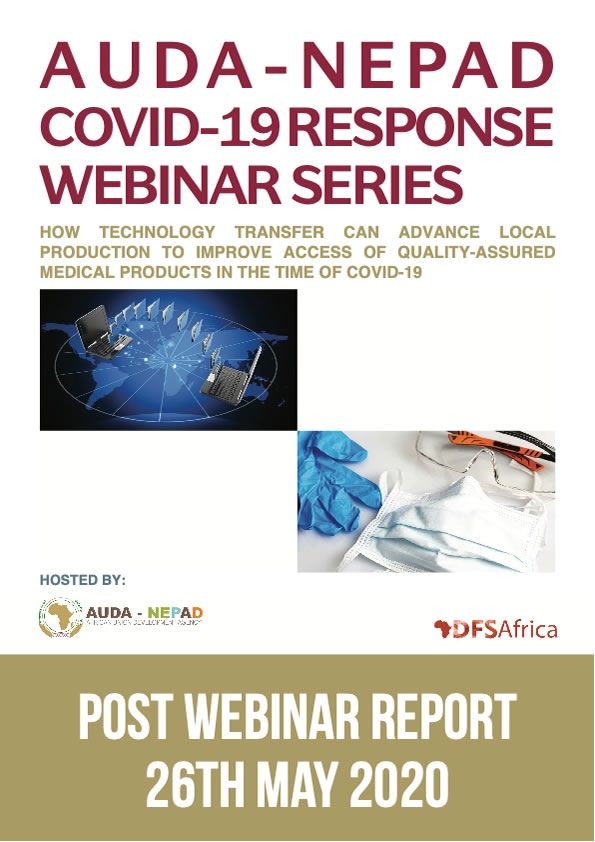Theme: How technology transfer can advance local production to improve access of quality-assured medical products in the time of COVID-19
The AUDA-NEPAD COVID-19 response webinars are designed to facilitate conversations on galvanising African manufacturers to supply pharmaceutical and medical products required to combat the COVID-19 pandemic. The webinar presentations focused on how technology transfer can advance local production of pharmaceutical products to improve access of quality-assured medical products in the time of COVID-19.
The opening address by Dr. Janet Byaruhanga, a Senior Programme Officer, Public Health at AUDA-NEPAD stated that technology transfer does not occur by accident. ‘It must result from the deliberate effort of various stakeholders in taking something from the research laboratory, protecting it through the IP system, licencing a company to produce it, obtaining regulatory approval to get it into the market place and making it accessible to all who need it’.
Furthermore, she stated that Africa’s governments should invest in creating an enabling ecosystem, leveraging partners and stakeholders support for effective technology transfer. It is our hope that all that research that has been published by universities within and beyond the borders of the African continent do not remain in journals but should translate into products that can bring about improvements in the socioeconomic wellbeing of African communities.
The keynote speaker Dr. Emily Kaine, Senior Vice President at the United States Pharmacopeia stated that across the main drivers of “competitiveness”; health and primary education, macroeconomic environment, infrastructure, innovation, institutions, business sophistication, market size, technological readiness, financial market development, labour market efficiency, goods market efficiency, higher education and training, African markets are still relatively disadvantaged.
She reiterated that technology transfer will be one of the levers through which African products and markets would gain competitiveness. She further defined the crux of technology transfer as the transfer of technical information, tacit know-how and performance skills, technical materials or equipment, jointly or as individual elements, with the intent of enabling the technological or manufacturing capacity of the recipients. Dr. Kaine posited that technology transfer should be considered as a possible solution in accelerating development of Africa’s pharmaceutical production base and Africa must leverage on its substantial potential – both as a producer and consumer, to drive socio-economic development and growth.
Dr. Kaine admonished the stakeholder groups present, that the aim of “tech transfer” can/should be more expansive, going beyond a sender/ receiver transaction, resulting in diffusion of capabilities. Furthermore, factors related toinnovative and absorptive capacity would frame the likelihood of successful technology diffusion and must be considered when fashioning strategies that would help with technology transfer.
Ms Cecilia brought the attention of attendees to the Tech Access Partnership (TAP) launched on 12th May as a joint effort by the UN Technology Bank, WHO, UNDP & UNCTAD to establish a global technology transfer platform to scale up local production of life-saving health technologies for COVID-19. Speed, reliability as well as enabling policy, legal and regulatory environment as critical enablers of effective tech transfer aimed at improving local production.
Dr Victor Konde focused his response on the need for ‘National intent’. What is the national ambition? Do the countries want to build an industrial base? What type of markets are we trying to create? All these questions and more need to be answered by national policy makers and governments. He called for a holistic approach involving both the public and private sector stakeholders as well as a need to develop and implement a generic curriculum for technology transfer for pharmaceuticals.
Dr. Skhumbuzo Ngozwana in his response emphasized on the power of technology transfer and how intent rather than having sufficient absorptive capacity should be the driving force for technology transfer in Africa. He cited countries such as India, Bangladesh, Tunisia, Algeria, who grew their local pharmaceutical production through technology transfer even though they all had little absorptive capability at the beginning. Technology transfer give the opportunity to lower cost and to increase competitiveness.
Dr. Frederick Meadows stressed the importance of absorptive capacity as an important ingredient for sustainable technology transfer. He highlighted the key drivers for timely technology transfer noting the importance of sender/receive alignment in critical areas such as skill set, regulatory environment e.g, ISO guidelines, WHO Prequalification that provide guarantees to access to markets etc.

